Crypto Bills Breakthrough
The US House passed three major crypto bills, including the GENIUS Act regulating stablecoins, now awaiting President Trump’s signature. The Act requires stablecoin issuers to back coins 1:1 with eligible assets and publish monthly reserve reports. Following the approvals, crypto markets rallied with total market capitalization nearing $4 trillion and XRP surging 12.7% in 24 hours. BTC and ETH ETFs recorded inflows of $522.6M and $602M respectively yesterday. Meanwhile, US retail sales rose 0.6% in June, beating expectations, and unemployment claims fell to their lowest since mid-April. Fed officials remain divided: some expect two rate cuts by year-end to support growth, while others emphasize holding rates steady due to rising tariff-driven inflation pressures.

Daily Updates:
- The crypto industry received a watershed victory yesterday as the US House of Representatives voted to pass the GENIUS Act, after the bill cleared the US Senate, a month ago. The bill can now be sent to President Trump to be signed into law.
- The GENIUS Act will be the first federal legislation in the US to regulate stablecoins. To summarise the Act:
- Any stablecoin issuer needs to “maintain reserves backing the issuer’s payment stablecoins outstanding on an at least 1 to 1 basis” with eligible assets including “United States coins and currency,” bank deposits, deposits held at a Federal Reserve bank, “Treasury bills, notes or bonds with a remaining maturity of 93 days or less”
- Stablecoin issuers will be required to publish a “monthly composition” of their reserves
- The Act prohibits interest- or yield-bearing stablecoins – therefore issuers will not be required to pass the yield earned from treasury securities backing their stablecoin on to users
- Allow bank and nonbank entities to issue stablecoins – the latter will be “supervised exclusively” by the OCC, while for the former, depending on the market cap of the stablecoin, supervision will be divided between federal and state regulators
- Advancements in “Crypto Week” did not just end on the GENIUS Act either. Lawmakers in the House also voted to pass the CLARITY Act (294 to 134 votes) and the Anti-CBDC Surveillance State Act (219 to 210 votes).
- The CLARITY Act aims to develop a more comprehensive regulatory framework for the entire crypto industry. The bill will now move on to the Senate for consideration.
- According to House Committee Chairman French Hill, “A fundamental choice is at stake about the future of money in America - a choice between privacy and government control. Whip Emmer’s Anti-CBDC Surveillance State Act safeguards the privacy of Americans by prohibiting the creation of a Central Bank Digital Currency in the United States”.
- Crypto markets are in the green on the day so far, with total market capitalisation closing close to $4T after the U.S. house approved the three major crypto bills – putting crypto just behind Nvidia, which hit $4.22T this month.
- BTC is up 1.3% over the past 24 hours, ETH up 5.5% and SOL trading just under $183, up 5.8%.
- XRP in particular has outperformed among the top 10 tokens by market capitalisation – currently trading at $3.5, it is up 12.7% in the past day and nearly 60% over the past month.
- Spot BTC and ETH ETF products continue to maintain their string of positive inflows too. The BTC ETFs saw inflows of $522.6M yesterday, while Ethereum ETFs outperformed and had another huge day as investors purchased $602M of ether tokens. That comes after recording the largest single-day of inflows earlier in the week on Wednesday.
- Short-tenor volatility for ETH options have slightly abated as 7-day options trade with an implied volatility 5 percentage points lower than yesterday. Still, that drop has not been large enough to flatten or ‘normalise’ the term structure, which remains inverted. Short-tenor volatility smile skews also remain skewed towards OTM call options, however that call-skew has relented from the over 10% levels it reached yesterday.
- Yesterday retail sales data showcased the US economy is still resilient amidst President Trump recently renewing his aggressive tariff stance on numerous US trade partners.
- Retail purchases rebounded in June, after two months of declines, increasing 0.6% – above most estimates in a Bloomberg survey of economists.
- Ten of the 13 categories posted increases, while spending at restaurants and bars, the only service-sector category in the report, advanced 0.6%.
- That helped both the S&P 500 and Nasdaq-100 close at record highs.
- Following the release, President Trump, as he often has following macro releases wrote “‘Too Late:’ Great numbers just out. LOWER THE RATE!!! DJT”.
- The retail sales data was also accompanied by a tame initial jobless claims report yesterday. That showed applications for US unemployment benefits had declined for a fifth straight week, now to their lowest level since mid-April.
- In an interview on Bloomberg TV, San Francisco Fed President Mary Daly claimed it is still reasonable for FOMC members to plan on two interest-rate cuts before the end of the year. According to Daly, businesses have so far withstood President Trump’s tariffs and consumers are still spending – “At the same time, you can’t wait forever, because if we wait til inflation is 2%, well then we’ve lost, we’ve likely injured the economy in some way that was completely unnecessary”.
- Daly’s views contrast that of other Fed members this week. At an event in Washington, Governor Adriana Kugler said “Given the stability in the employment side of our mandate, with the unemployment rate still at historically low levels, elevated short-run inflation expectations and goods inflation rising due to the upward pressure from tariffs, I find it appropriate to hold our policy rate at the current level for some time”.
- Kugler cited that core inflation from the recent CPI report came in higher than May and that core goods inflation has pushed up overall inflation recently.
- To her, firmer core goods inflation is “partially reflecting the pass-through of increased tariffs, which has been shown by research done at the Fed”.
- She added that “there are many reasons to think that larger effects of tariffs are still coming. First, businesses built up inventories ahead of anticipated tariff increases, giving them leeway to still sell goods at pre-tariffed prices. Second, given the many changes in implemented tariff policies, businesses may not yet be passing the higher tariffs to their selling prices because they are waiting for greater clarity. Third, businesses, especially larger ones, may also be waiting to capture market share from others that hike prices sooner.”
- New York Fed President John Williams is also in the camp of expecting higher tariff-induced inflation in the upcoming few months.
- In a speech on Wednesday Williams said “One question comes up a lot these days: ‘All we hear about is tariffs, tariffs, tariffs. But then why hasn’t inflation gone up?’”
- Like Kugler, he argued that “We are seeing initial effects of tariff increases on core goods prices. Specifically, for items that are more exposed to higher tariffs—household appliances, musical instruments, luggage, tableware”
- He added that “It's important to note that it’s still early days for the effects of tariffs, which take time to come into full force”.
- “All in all, although we are only seeing relatively modest effects of tariffs in the hard aggregate data so far, I expect those effects to increase in coming months. Overall, I expect tariffs to boost inflation by about 1 percentage point over the second half of this year and the first part of next year.”
- Donald Trump is considering an executive order that could allow Americans to allocate part of their 401(k) retirement savings to crypto and other alternative assets like metals, infrastructure funds, corporate takeovers and private loans.
- The potential order would task agencies with studying the viability of allowing investments in digital assets and with identifying any regulatory hurdles that still exist.
- Cryptocurrency mining business, Bit Origin Ltd (NASDAQ: BTOG) has secured agreements with accredited investors to raise up to $500 million through the sale of Class A shares and convertible debt, to create a Dogecoin treasury strategy.
- The company anticipates becoming one of the largest public holders of Dogecoin by increasing Doge-per-share, reflecting its long-term belief in Doge’s value and its potential adoption in payment systems like X Money.
- Nasdaq has filed a 19b-4 proposal with the SEC to allow BlackRock's iShares Ethereum Trust to permit staking of ether held by the Trust.
- SharpLink Gaming have filed to amend their share offering from $1 billion to $6 billion to expand its Ethereum holdings. With the full $6 billion, SharpLink could own nearly 1.38% of Ethereum’s total circulating supply.
- In just nine days, the company acquired $515 million worth of ETH, bringing its total to over 280,000 tokens. This surge in accumulation has made SharpLink the largest corporate holder of Ethereum, overtaking even the Ethereum Foundation.
This Week’s Calendar:


Charts of the Day:
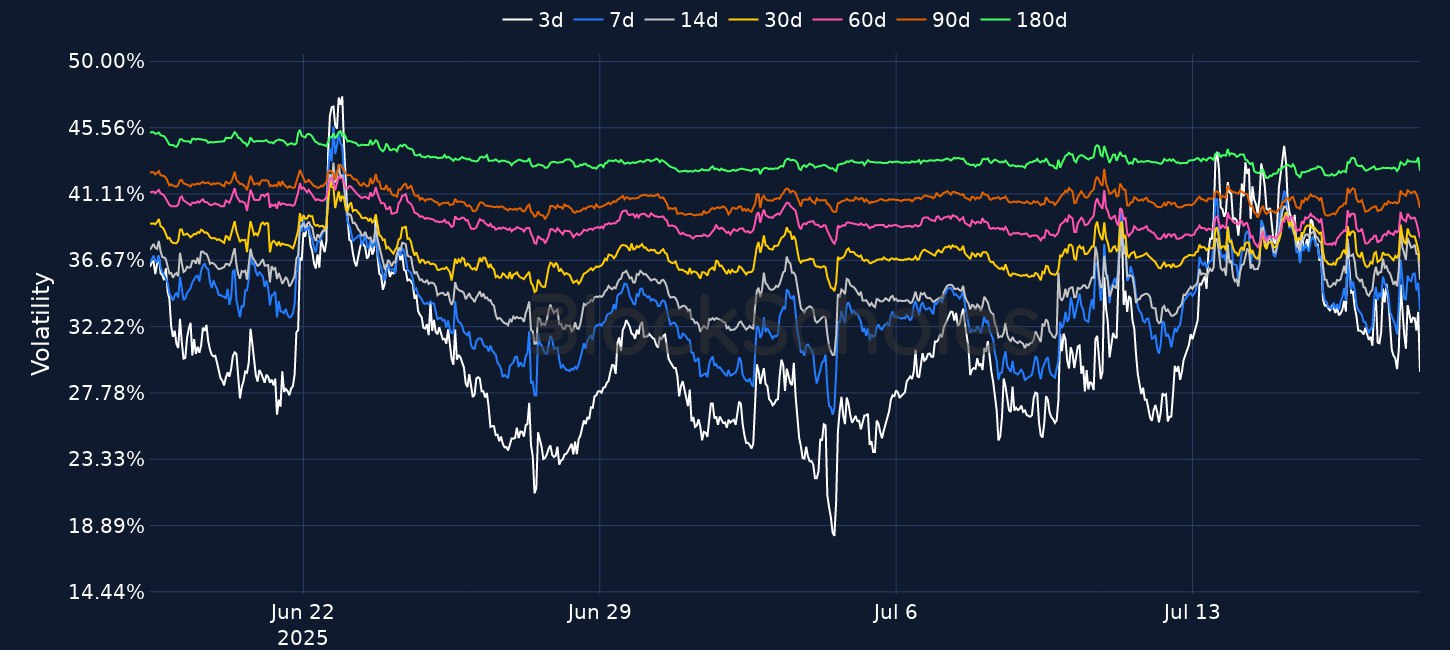
Figure 1. BTC at-the-money implied volatility across selected tenors. Source: Deribit, Block Scholes
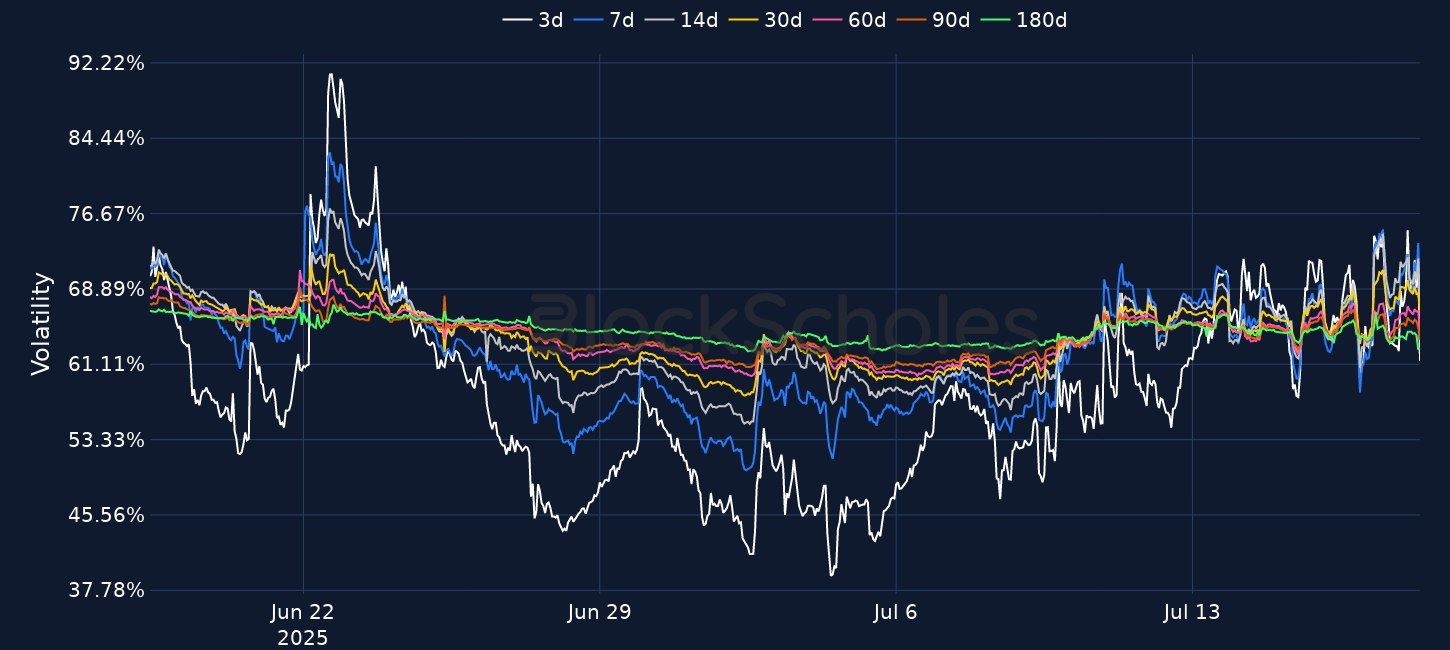
Figure 2. ETH at-the-money implied volatility across selected tenors. Source: Deribit, Block Scholes
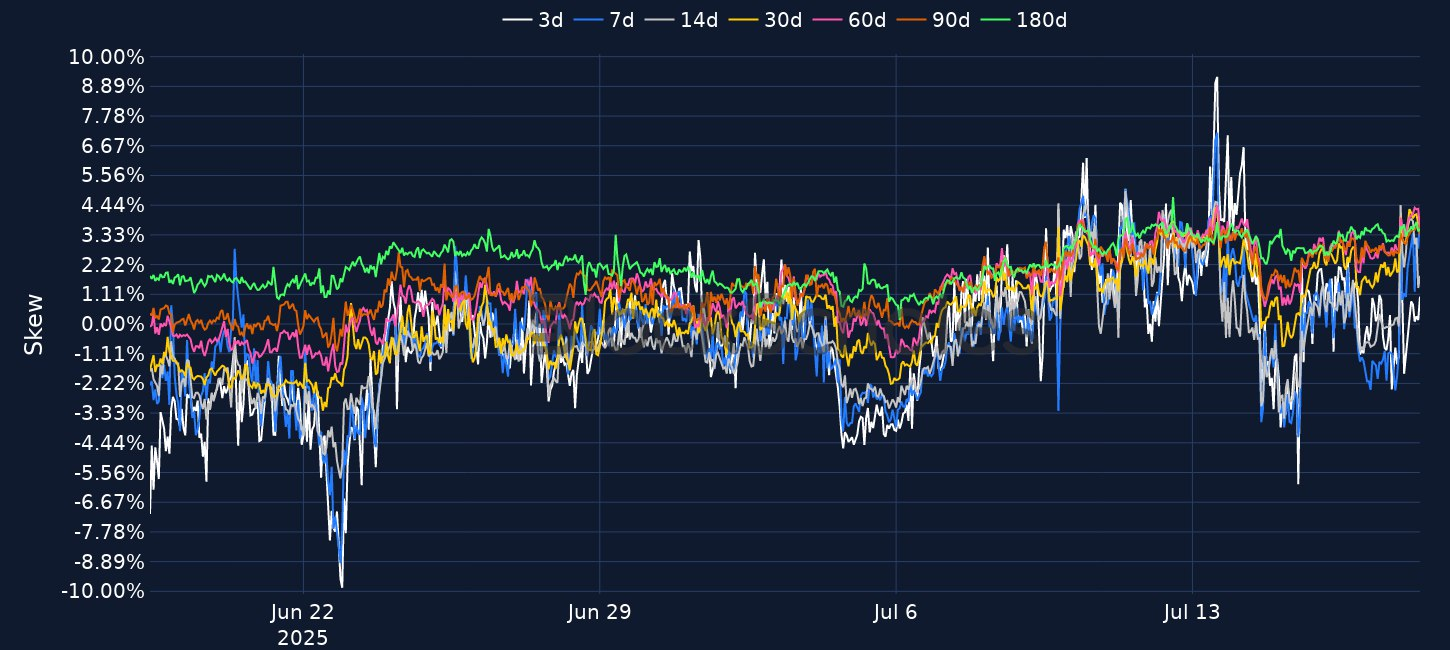
Figure 3. BTC 25-delta put-call skew ratio across selected tenors. Source: Deribit, Block Scholes
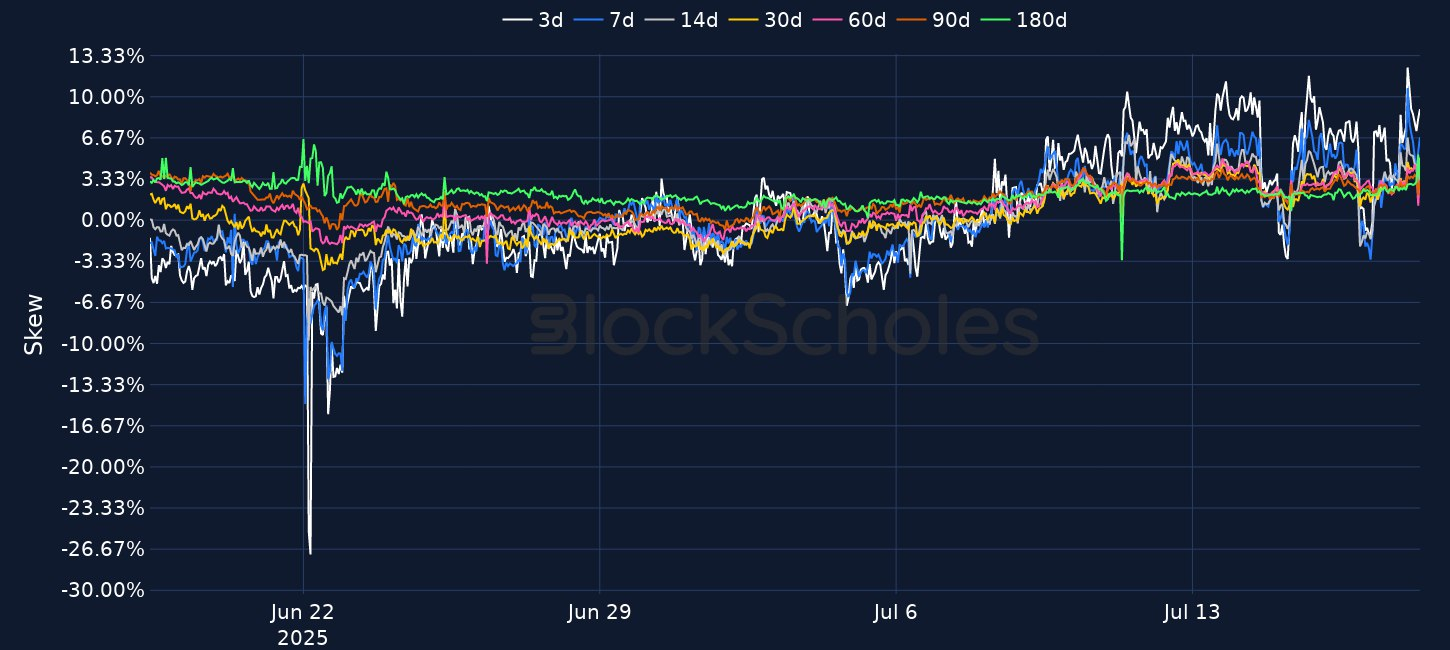
Figure 4. ETH 25-delta put-call skew ratio across selected tenors. Source: Deribit, Block Scholes
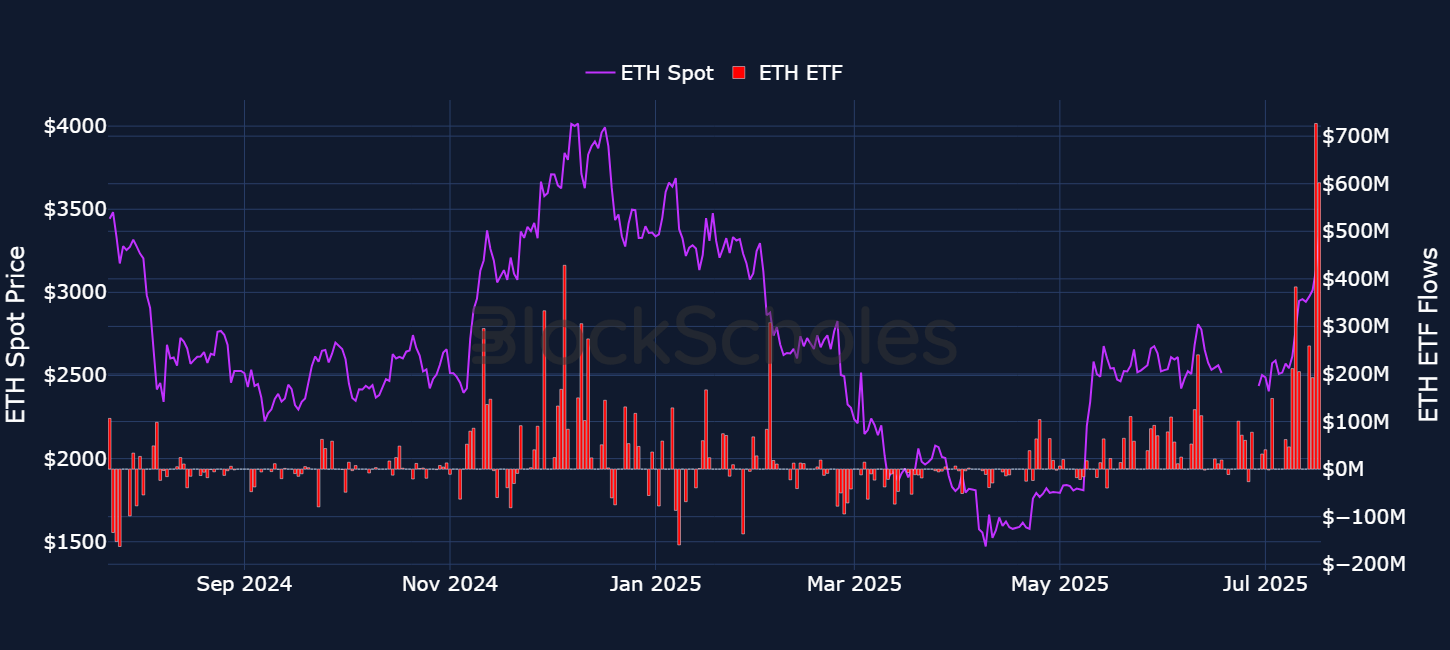
Figure 5. ETH Spot Price, ETH ETF Flows. Source: Farside Investors, Block Scholes


